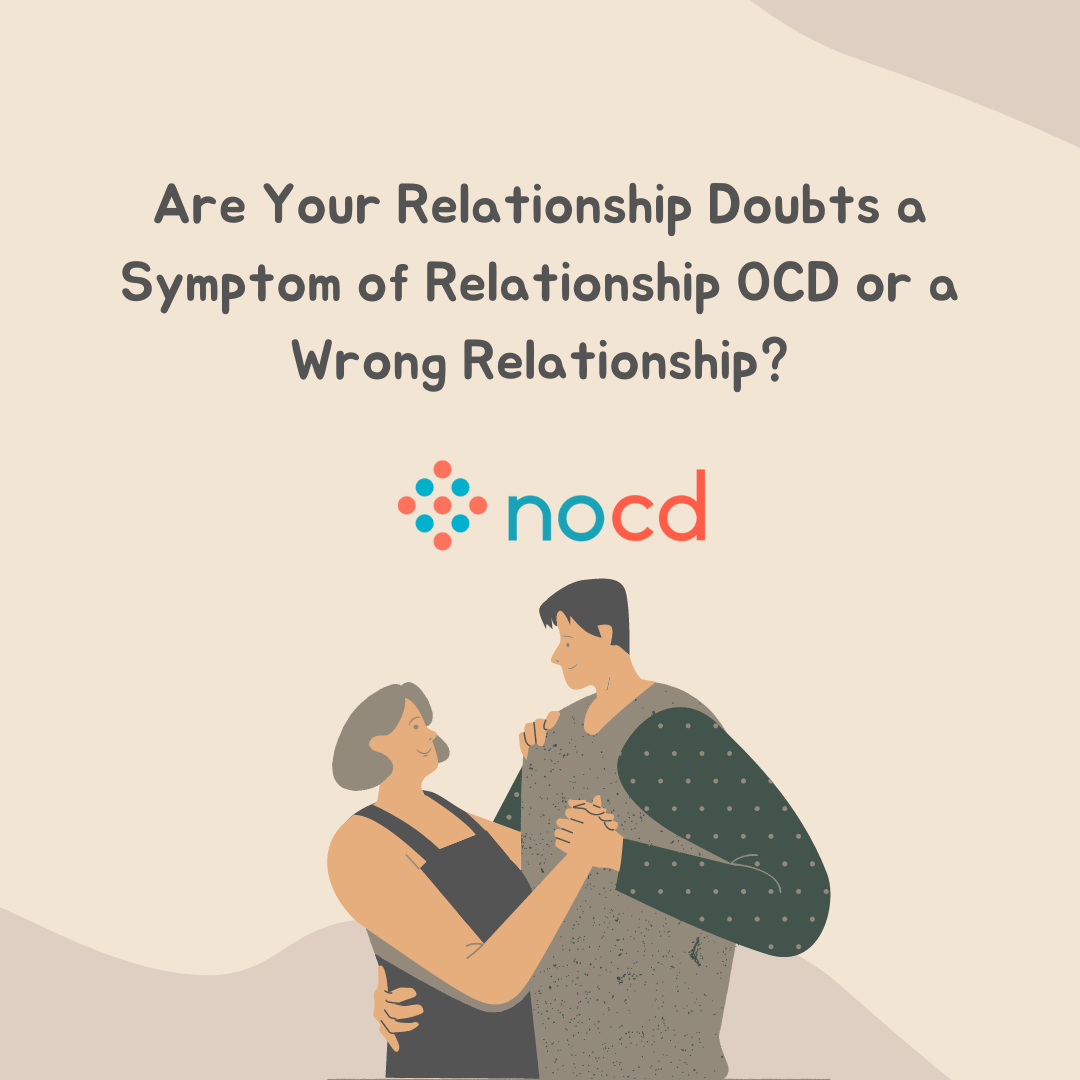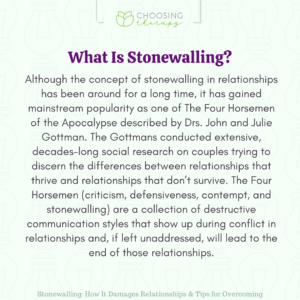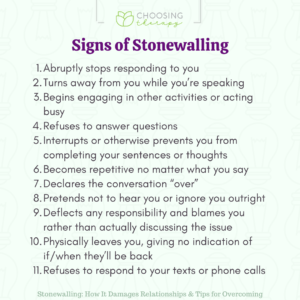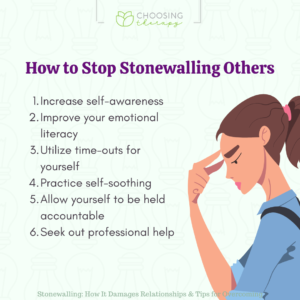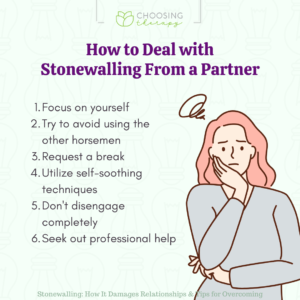Stonewalling is a harmful communication style, and one of The Four Horsemen as described by Dr. John Gottman. Rather than communicate with the other person during arguments or discussions, the person stonewalling will become unresponsive, walk away, or avoid engagement due to emotional overwhelm. While difficult to stop, it is possible to learn healthier communication strategies to break the stonewalling patterns and improve your relationships.
Are communication issues hurting your relationship? ReGain specializes in helping individuals and couples repair their relationships. Complete a brief questionnaire to be matched with a therapist. Start online counseling for as little as $65 per week.
What Is Stonewalling?
Although the concept of stonewalling in relationships has been around for a long time, it has gained mainstream popularity as one of The Four Horsemen of the Apocalypse described by Drs. John and Julie Gottman of The Gottman Institute. The Gottmans conducted extensive, decades-long social research on couples trying to discern the differences between relationships that thrive and relationships that don’t survive.1 The Four Horsemen (criticism, defensiveness, contempt, and stonewalling) are a collection of destructive communication styles that show up during conflict in relationships and, if left unaddressed, can lead to relationship burnout, and potentially the end of those relationships.
Why Do People Stonewall?
The Gottman Method of couples therapy views stonewalling as the inevitable end stage of damaging styles of communication during conflict.2 After enough criticism, defensiveness, and contempt, someone’s only refuge may be complete withdrawal in an effort to protect oneself from the intense negativity they’ve endured. In this format, stonewalling (or shutting down completely) is a result of emotional overwhelm.
“In order to understand stonewalling, we have to consider the purpose of it. Stonewalling can serve as way to regulate oneself when flooded or overwhelmed. In the context of close relationships, it may give one partner the space and time to make sense of what is happening. Sue Johnson, the developer of emotionally-focused therapy, helps us remember that the behaviors of one partner have a profound impact on the perceptions and emotions of the other. As such, the problem with the stonewalling strategy is that it leaves one’s partner(s)/close others ‘out in the cold’ and can promote further distress.” – Dr. Jody Russon, Ph.D.8
When a person becomes very activated and flooded with emotions, they often become unable to communicate effectively. This includes both getting a point across or receiving input from the other person. The problem, however, is that once you’ve started using that as a way to deal with emotional intensity, it becomes a very difficult habit to stop!2
Is Stonewalling Abuse?
Stonewalling can also be a tool of emotional abuse. Very commonly used by narcissists as a way of controlling and manipulating another person (although it’s not JUST narcissists who do this!).3 In this situation, it is not necessarily related to emotional overwhelm—rather, it’s a tactic intended to silence, coerce, and/or punish. It shuts down conversation and discourages the other person from expressing needs, concerns, and displeasure with the relationship.
People with narcissistic tendencies tend to want to shut down discussions around topics that make them uncomfortable, subjects that expose any of their shortcomings, and issues that center your feelings or experiences within the relationship. They are not interested in any narrative outside of their own. Stonewalling is often used in conjunction with gaslighting to keep someone silent and compliant in the relationship.3
According to Dr. Russon, “the definition of gaslighting implies intent (i.e., manipulation). Stonewalling, on the other hand, is often a response to being overwhelmed. While stonewalling could be used to manipulate another, this intention is not embedded into the definition. Both gaslighting and stonewalling are often signs of relational distress. When they are performed systematically for the purposes of demeaning or controlling another, they might be considered abusive.”8
Signs of Stonewalling
When most people think of stonewalling, they think of “the silent treatment,” but it can be so much more than that. When stonewalling is being used as a control tactic (as opposed to it being a response to emotional overwhelm) it is often accompanied by gaslighting,3 which is a form of emotional abuse intended to make the victim doubt their thoughts, feelings, and reality. You might be told that you are overreacting, or you are “putting words in my mouth,” or just flat-out told that whatever it is that you think happened is false.
During a conflict or heated discussion, a stonewalling partner may:
- Abruptly stop responding to you
- Turn away from you while you’re speaking
- Begin engaging in other activities or acting busy
- Refuse to answer questions
- Interrupt or otherwise prevent you from completing your sentences or thoughts
- Become repetitive no matter what you say (eg. “okay” or “fine”)
- Declare the conversation “over”
- Pretend not to hear you or ignore you outright
- Deflect any responsibility and blame you rather than actually discussing the issue
- Physically leave you, giving no indication of if/when they’ll be back
- Refuse to respond to your texts or phone calls
There are any number of ways that a person can refuse to engage with you and treat you as if you don’t exist. A surefire way to know if you are being stonewalled is to check in with yourself about how you are experiencing the person and the relationship:
- Do you feel heard and understood?
- Do you feel apprehensive about raising concerns?
- Do you find yourself holding back in communication because you want to avoid punishment? Or just don’t want a fight?
- Do you feel as if you have to convince or win your partner over much of the time?
Would better communication improve your relationship?
OurRelationship (Free Couples Course) – OurRelationship has been proven to help couples improve communication, intimacy, and trust. 94% would recommend it to a friend. Get Started
Couples Counseling – ReGain specializes in helping individuals and couples repair their relationships. Complete a brief questionnaire to be matched with a therapist. Start online counseling for as little as $65 per week. Visit ReGain
Examples of Stonewalling
Stonewalling is not just relegated to romantic relationships, although this is where most of our minds go. It can also show up in your friend, family, and work relationships as well. Again, it may be the result of an inability to manage overwhelming emotions, or it may be a tool of manipulation or control. Either way, the effects are essentially the same and stonewalling can have devastating effects on relationships and on a victim’s sense of self. Here are a few examples of how it may sound.
Stonewalling in a Couple
Although stonewalling is not an inherently gendered response to emotional overwhelm, Dr. Gottman’s research indicated that it is more likely to come from the male partner in heterosexual relationships.1 When a partner is struggling with emotional overwhelm and fear of conflict, stonewalling in a marriage often involves avoiding talking about uncomfortable topics by just going along with whatever their spouse says (even when they disagree), or keeping themselves intentionally busy or being otherwise unresponsive when their spouse wants to have a conversation.
However, when the partner is using stonewalling as a tool of control and manipulation, it often takes the form of gaslighting (or denying the spouse’s reality), giving the silent treatment when the spouse doesn’t behave in a way that they want (as punishment), and flat-out shutting down conversations or even leaving the house without giving any clear indication that they will return.
Stonewalling at Work
Stonewalling can make the office environment feel very toxic, hostile, and uncomfortable for everyone, even those not directly involved in any particular conflicts.4 The refusal to communicate is often displayed with body language when it occurs in the workplace. For example, making a point of leaving a room when certain people enter and intentionally refusing to have conversations that co-workers, superiors, or subordinates have requested. Perhaps your supervisor is always around when it’s time for a reprimand, but when you have concerns about your compensation or the weight of your workload, something always seems to come up and prevent those meetings.
A co-worker may routinely refuse to speak directly to you, avoid eye contact, and when you speak in a meeting they are disengaged or attribute your contribution to someone else. Or maybe one of your subordinates ignores every bit of direction you give, choosing to do things their own way and refusing to accept or acknowledge the consequences of that behavior.4
Stonewalling in a Friendship
Much like stonewalling in a marriage or romantic partnership, stonewalling in the context of platonic friendships leaves the victim of the behavior feeling invisible and isolated. It may look like a friend who never wants to talk about anything they’ve done to harm the relationship, minimizing your feelings or telling you that you’re too sensitive or need to relax. Perhaps they hit you with the silent treatment when they are upset with you rather than just discussing their concerns with you. You may feel like you need to walk on eggshells because you don’t know what might trigger these episodes and you don’t know how long they’ll last.
Stonewalling in a Family
Stonewalling in families has the potential to be particularly problematic and dysfunctional, as it can create ripple effects for generations. When a parent or close family member stonewalls a child, it sends several messages that, when gone unchecked, can only truly be undone with work in therapy. What it often looks like is giving the child the silent treatment when they behave in ways that the parent disapproves of. It looks like never apologizing or acknowledging when they’ve done something harmful, leaving the child with no opportunity to express sadness, hurt, or anger. It can also involve refusing to listen to a child’s concerns, or taking a “my way or the highway” stance on everything.
The impact of this behavior is devastating, as it sends the message that the child is only valuable when they “act right,” and can lead to severe codependent tendencies. It can breed beliefs about their self-worth that will impact how they move in the world as they grow into adults. Because they may not feel worthy of care and concern unless they perform in some way, they are likely to accept abusive behaviors from friends, bosses, co-workers, and romantic partners for years to come.
How to Stop Stonewalling Others
Stonewalling is a learned behavior, and as such, you can learn to behave differently. This will take some work and intentional effort to make different choices. What makes changing this behavior difficult is that, on some level, avoidance works! It gives you relief in the short-term from whatever discomfort is being caused by showing up and engaging in deep and meaningful ways. However, in the long run, it leaves you isolated and disconnected from the people about whom you care the most.
If you have a tendency to use stonewalling in your relationships, here are six ways to start breaking that pattern:
1. Increase Self-Awareness
There is no problem that can be solved without first acknowledging that it is there. Perhaps this article is the first time you’ve ever considered that the way you communicate may be problematic. This is the first step! Paying close attention to how you behave when conflict arises in your relationships (at home, at school, at work, etc), and more importantly to how you feel when they arise is key. Becoming aware of what is happening (and trying to suspend your judgment while you do so) will help you to see where and how you can change.
2. Improve Your Emotional Literacy
Emotional literacy involves the ability to recognize and name your feelings at any given moment. This can be an incredibly difficult and complicated task for some, especially if you grew up in a situation in which your ability to express yourself was constricted, you weren’t allowed to exhibit uncomfortable emotions, or you were parented by people whose emotions were explosive. Being able to identify what you’re feeling is a skill and it can be taught.
Often, if you struggle to name your emotions, it is helpful to start with describing how you feel physically: tightness in the chest, tension in the shoulders, knot in the stomach, etc. This can be a helpful tool on the path to actually connecting with your emotions.
3. Utilize Time-Outs for Yourself
When you are engaged in conflict and things are escalating, there comes a point of no return when you’re no longer able to communicate effectively and also can’t take much in from the other person. This is where we end up saying harsh, mean, even cruel things that we cannot take back and probably don’t fully mean. In this instance it is in everyone’s best interest to take a break. Dr. Gottman suggests no less than 20 minutes, and as long as 24 hours or so if needed. Both parties need time to be able to re-engage the reasonable parts of their brain so that they can have a more rational conversation.
There are two very important things you need to do during this break:
- Agree upon the length of the break and be very clear that you will be coming back to the conversation afterward
- Use the break time to self-soothe
Do not use this time to formulate new arguments to win the fight, or replay everything over in your head. That is counterproductive because it doesn’t allow you to truly calm down, and you will return from the break just as activated as you were when you left.
4. Practice Self-Soothing
If you struggle with self-soothing, it’s likely because you weren’t taught how, because your parents didn’t know either. Self-soothing refers to behaviors that we engage in that help us to regulate our emotional state.
Examples of self-soothing activities include:
- Walking/pacing
- Taking deep cleansing breaths
- Lighting a candle
- Playing calming music (or not so calming, if that works for you!)
- Taking a hot shower
- Drawing or coloring
- Playing a video game
The list could go on and on because we are all very different and there are infinite possibilities for what might be soothing to us. However, there are some behaviors that you may think are self-soothing, but are actually more self-numbing. The goal of self-soothing isn’t to escape (eg. engaging in addictive behaviors), but to recalibrate, bringing yourself back to an optimal level of functioning so that you can engage with others in a more healthy and constructive way.
5. Allow Yourself to Be Held Accountable
It is natural to become defensive when we feel criticized. You don’t have control over what feelings arise, but you do have control over how you interact with them. Hopefully, in doing the work in the first four tips, you will be able to recognize when it’s happening and take steps to prevent your defensiveness from derailing the conversation.
This is particularly important because it will be concrete evidence for your partner (or whoever the other person is that you’ve stonewalled in the past) that it is safe to talk to you about things that make you both uncomfortable. This will usually impact how they speak to you for the better, which will lead to less defensiveness on your part as you move forward.
6. Seek Out Professional Help
All the steps listed above are very much easier said than done! It’s not impossible to implement these tactics and make changes in yourself and in your relationships, but you don’t have to go it alone. Engaging in therapy can be immensely helpful as you work towards healthy expression of your emotions and build healthy relationships with the people in your life.
Are communication issues hurting your relationship? ReGain specializes in helping individuals and couples repair their relationships. Complete a brief questionnaire to be matched with a therapist. Start online counseling for as little as $65 per week.
How to Deal With Stonewalling From a Partner
Understanding what lies beneath the stonewalling is an important part of dealing with it appropriately. If your partner, friend, co-worker, etc. is stonewalling because of emotional overwhelm and inability to manage, then there are a few things you can do to try and foster more connection with them. However, if that person is stonewalling as a means of control and manipulation, you may be in a position where you have to plan your exit from that relationship.5 When stonewalling is a form of abuse, it can be both difficult and dangerous for you to try and strengthen your connection with that person. Staying in that situation leaves you vulnerable to further abuse and manipulation, further damaging your sense of self and emotional well-being.
Here are six ways to help you manage a stonewaller:
1. Focus on Yourself
Being stonewalled creates a lot of emotional responses. You might feel sad, frustrated, angry, disappointed, hurt, disregarded, and alone. It’s important for you to be able to recognize what you’re feeling, and to consider that the stonewaller is struggling with emotions, too. This helps you not to take it too personally and gives you space for empathy. You shouldn’t ignore your feelings, rather, you can use your feelings to foster empathy for your partner and recognize that it isn’t just about you.
Communicate about what you’re feeling, but don’t communicate from your feelings. If emotions are driving the things you say, it leaves you in a position where you might say some things you wish you could take back once the dust settles. It is perfectly acceptable to describe the behavior you’re seeing and name the emotions that are arising for you. It may not get through to your partner, but you will know that you’ve expressed yourself clearly and you didn’t just ignore the problems you’re experiencing.
2. Try to Avoid Using the Other Horsemen
Given that the four dysfunctional communication styles are nicknamed the four horsemen of the apocalypse, it stands to reason that using them in this type of situation is not the best idea.
Here are a few things to avoid when trying to deal with stonewalling behavior:
- Using words like “always” and “never”
- Pointing the finger and placing blame
- Using sarcasm, ridicule, or name-calling
3. Request a Break
If you’re doing the work of self-monitoring (without judgment!) and building self-awareness, you should be able to acknowledge and even predict your triggers during conflict. You may also become pretty good at seeing the emotions rising in others, especially people with whom you’re quite close. This means that you can tell when a break is necessary! Asking for a time-out, specifying how long, and then engaging in the self-soothing behaviors of your choice can help you let your partner know that you see when things are getting too heated and you would both benefit from some time apart.
4. Utilize Self-Soothing Techniques
Utilizing self-soothing activities can bring your nervous system back down to functioning levels where you can actually process emotions and help you believe that your partner’s behavior is not a reflection of who you are and what you deserve in relationships.
5. Don’t Disengage Completely
It’s really hard to keep trying when someone has checked out. I am not recommending that you try to communicate with someone who is so emotionally flooded and checked out that you might as well be speaking a foreign language—I am suggesting that you be clear about what you’re doing to take care of yourself and why. For example: “I can see that you’ve checked out, so I’m going to go and grab a shower and see if we’re able to talk when I get back.” This reassures the stonewaller that you haven’t given up on them, but also establishes a boundary that you are not going to be treated as if you don’t exist and don’t matter. It also gives you time to self-soothe and manage the emotions that arise when you’ve been stonewalled.
6. Seek Out Professional Help
Individual therapy can teach you how to stay connected with your emotions without being overtaken by them. Also, if you find yourself in a pattern where all your past partners have been stonewallers, that is a concern that can be addressed in therapy. Perhaps you are drawn to people who shut you out because that is a familiar aspect of your upbringing, and you should work with a therapist who can help you understand your self-worth and what you deserve from a relationship.
When Can Couples Therapy Help?
Couples therapy typically allows you to hear things communicated more effectively and clearly from the therapist. In couples therapy, you and your partner have the potential to learn a lot about yourselves and each other that you may not have been able to learn on your own. You can use an online directory to find a couples therapist that works for you.
Final Thoughts
Stonewalling can destroy relationships and negatively impact the emotional well-being of anyone who has to endure this sort of treatment. It is a learned behavior, and if you’ve fallen into this pattern you can also learn something different. Engaging in therapy can be incredibly helpful, both individual therapy and couples therapy. But in the meantime, talk to your partner. If you truly value your relationship, the discomfort that may arise at the prospect of having these discussions is well worth experiencing if it means you can, together, craft a relationship that leaves you both feeling loved and appreciated.
Additional Resources
To help our readers take the next step in their mental health journey, Choosing Therapy has partnered with leaders in mental health and wellness. Choosing Therapy is compensated for marketing by the companies included below.
BetterHelp (Online Therapy) – Relationships aren’t easy – a licensed therapist can help. Live sessions can be done via phone, video, or live-chat. Plus, you can message your therapist whenever you want. Visit BetterHelp
Online-Therapy.com (Online Couples Therapy) – Do you and your partner want to work together to have less arguments and better communication? Are there children involved and being caught in the crossfire? Do you love each other but are having a rough time operating as one unit? Couples therapy can help. Get Started
OurRelationship (Free Couples Course) – OurRelationship has been proven to help couples improve communication, intimacy, and trust. 94% would recommend it to a friend. Get Started
Relationship Newsletter (Free From Choosing Therapy) – A newsletter for those interested in improving relationships. Get helpful tips and the latest information. Sign Up
For Further Reading
- The Seven Principles for Making Marriage Work by John Gottman
- Raising an Emotionally Intelligent Child: Book – Parents
- How to Be an Adult in Relationships by David Richo
- The Wizard of Oz and Other Narcissists: Coping with the One-Way Relationship in Work, Love, and Family | Eleanor D. Payson, LMSW
- Gaslighting & Narcissistic Abuse Recovery: Recover from Emotional Abuse, Recognize Narcissists & Manipulators and Break Free Once and for All
- How to Be a Good Boyfriend: 20 Tips for a Healthy Relationship
Best Online Marriage & Couples Therapy Options Marriage and couples therapy can be helpful and a worthwhile investment for couples who want to seek help with their relationship. Which online platform will work best for you will depend on what issues you want to work on, what your goals are for your relationship, the cost, and if it’s available in your state. OurRelationship - Free Relationship Course Are Your Relationship Doubts a Symptom of Relationship OCD or a Wrong Relationship? Have you ever wondered to yourself, “What if I’m not in love with my partner anymore? What if I’ve never been?” For some people, these thoughts are more than occasional. They can become constant and overwhelming, and even lead to compulsive actions like seeking reassurance to quiet them. When these thoughts and actions rise to the level of obsessive-compulsive order (OCD), they are known as relationship OCD, or ROCD.

